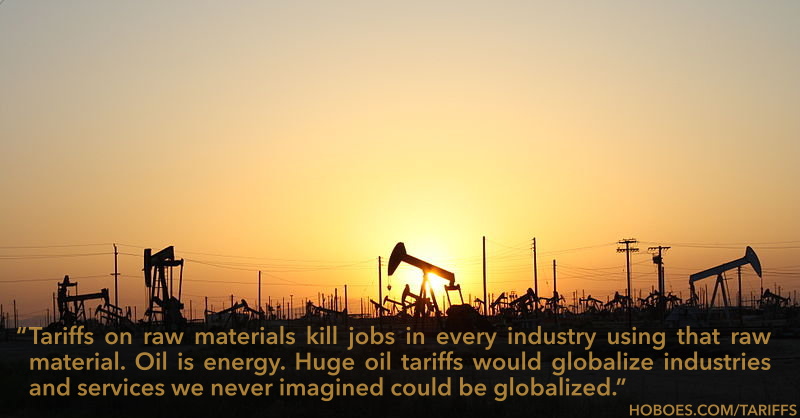My job fell in the (oil) well
When it comes to raising energy costs, it sometime seems as though The Weekly Standard’s Irwin M. Stelzer has never met a government regulation he didn’t like. In the May 2, 2016, Weekly Standard he argues for artificially keeping the cost of oil two to three times higher in the United States than in the rest of the world. That is, he wants the government to enact tariffs on imported oil that will keep the price high in the United States in order to protect oil extraction within the United States.
This is insanity. We tried something similar several times over the last several decades in the steel industry; steel tariffs cost five jobs among industries that use steel for each job saved in the steel industry itself. Companies such as the mostly-steel furniture-maker Shaw-Walker, which my father worked for, ceased to exist as a local business over this period, selling themselves to larger, global conglomerates. This is, literally, Basic Economics. As the author of that textbook, Thomas Sowell, put it in a 2012 interview:
The number of jobs in the steel [industry] is exceeded many times over in industries making steel products, from automobiles to oil rigs, refrigerators, locomotives, etc., etc. Tariffs that save jobs in the steel industry mean higher steel prices, which in turn means fewer sales of American steel products around the world and losses of far more jobs than are saved.
To different degrees, the same is true for any raw material, and oil most of all. Tariffs are usually a bad idea because they only increase costs inside the country that imposes the tariffs. The rest of the world continues to enjoy lower costs. In the case of steel, it meant that US businesses that used steel were at a disadvantage against their global counterparts: global businesses had access to lower-priced steel unencumbered by US tariffs.
Which meant that domestic businesses that used steel either lost a lot of business, went out of business completely, merged with other companies, or had to move some operations overseas in order to stay in business. Whatever option they chose, it meant fewer jobs in the United States.
Steel tariffs were crazy because steel goes into a lot of manufacturing, and so we lost a lot of manufacturing jobs. Oil tariffs are infinitely crazier. Oil is energy. Energy goes into literally everything we make and everything we do. Energy goes into manufacturing, it goes into transportation, it goes into services—even purely service-oriented industries still have to keep the lights on and the computers running. Oil tariffs that double or triple the cost of oil, as Stelzer suggests, would put every business in the United States at a major disadvantage compared to the rest of the world.
Stelzer barely acknowledges the tradeoffs involved. At the very end of the article, he asks “Would there be unintended consequences?” and then answers “There always are.” That’s the extent of his examining the disadvantages of raising energy prices within the United States but not the rest of the world. But the “unintended consequences” of a tariff of this magnitude wouldn’t just mean massive job loss; it would accelerate the loss of expertise in manufacturing and some services, and spread that loss of expertise to every industry that could possibly have global competition. Further unintended consequences would be to globalize industries and services that we never even imagined could be globalized. It’s hard to imagine how long it would take to recover from such a boneheaded move.

Stelzer concludes by asking, “Is there a better way to spare any future president of the United States the need to bow before a Saudi King? I don’t think so.”
The idea that a solution might be found in making people more free rather than through killing American industry doesn’t seem to occur to him. But here are a few ideas:
At the very least, stop threatening people who are buying more of this cheaper oil than they can immediately use. If the Saudis want to sell oil at or below cost, don’t discourage American companies from taking advantage of artificially low prices now to protect against price increases in the future. If the Saudis are going to sell below cost, make it their problem, not ours. If someone starts selling dollar bills for fifty cents, they’re not going to make it up on volume.
Second, one of Stelzer’s listed problems is a self-inflicted one. Stelzer believes that once the Saudis start raising prices again, domestic producers are going to leave those profits on the table and not restart oil production, despite having all the resources sitting dormant in Texas, Oklahoma, and other domestic sites. There will, certainly, be a delay in restarting those facilities, but that’s mostly because of the difficulty in starting businesses and hiring people in the United States. Reduce the burden on starting and expanding businesses, and that drag on competition against the Saudis raising prices goes away. If we can once again start up businesses and ramp up hiring quickly, then as soon as the Saudis start raising prices, we go back into production.
And finally, we can compete against low prices in less free countries in ways other than tariffs. The cost of doing business in the United States is heavily inflated by artificial, government-created costs: the need to be experts in tax law, and to take money from employee pay checks and send them to the government, for example, and the need to be experts in health insurance, and the need to maintain teams of lawyers on retainer. And then there are all the arcane regulations and taxes applied directly to businesses. Reduce these artificial costs, and the costs of American products go down.
The result won’t just be that United States oil companies compete better overseas; every business in the United States will compete better against their overseas counterparts. Many businesses would bring jobs back into the United States that they once felt compelled to outsource in order to compete in the global market.
The Saudis have the luck of location; the Chinese a captive employee base. We’re the United States. We can and should compete on superior freedom. Lift the regulatory burden from creating startups and jobs in the United States, and the cost of doing business in the United States will better compete against the cost of doing business outside the United States.
Stelzer warns us that we will once again be “dependent” on Saudi oil if we don’t raise tariffs. But using someone else’s cheaper product isn’t dependency. We know we have our own oil. We know how to extract it. If we choose to buy Saudi oil while theirs is less expensive, saving ours for later, that doesn’t make us dependent on them. It makes them dependent on us—they need us for their profits, and we don’t need them for their oil.
Stelzer also implies that he believes the Saudis are telling the truth when they say they’re willing to forego indefinitely the profits that fund their lavish royal lifestyle. I doubt that this is true. But even if it is, it’s crazy to raise prices on literally everything in the United States, kill millions of jobs, and send uncounted industries overseas, in order to benefit one industry.
In response to The Bureaucracy Event Horizon: Government bureaucracy is the ultimate broken window.
- 10 Questions With Thomas Sowell: John Hawkins
- “The number of jobs in the steel is exceeded many times over in industries making steel products, from automobiles to oil rigs, refrigerators, locomotives, etc., etc. Tariffs that save jobs in the steel industry mean higher steel prices, which in turn means fewer sales of American steel products around the world and losses of far more jobs than are saved.”
- Basic Economics: A Citizen’s Guide to the Economy
- Economics is an important topic, because unlike every other complex field, “from botany to brain surgery”, we cannot avoid taking part: while we can, and usually should, refuse to perform brain surgery, we should not refuse to vote for politicians (and, in some states, initiatives) that have wide-ranging economic effects.
- Jobs Versus Net Jobs: Thomas Sowell
- “One of the reasons for the popularity of political rhetoric is that everybody can be right, in terms of their own rhetoric, no matter how much the rhetoric of one side contradicts the rhetoric of the other side.”
- Well, Well, Well: Irwin M. Stelzer at The Weekly Standard
- The Saudi war on frackers.
More Irwin M. Stelzer
- Republican President must keep Roosevelt’s word
- Even if a future conservative president doesn’t believe Americans of Japanese descent are disloyal, says Irwin Stelzer, he should think twice before rescinding President Roosevelt’s Executive Orders. The President’s honor—and the nation’s—is more important than politics.
- Global weirding and the compromise class
- Conservatism does not grant government more power: compromise between conservatism and the left does. But compromise between the truth and a lie is always a lie, in the case of global catastrophes, catastrophic as well.
- Just a jump to the Left
- The cry of the beltway is that conservatives should always jump to the left in the dance of government. No matter how often they’re proved wrong. It’s like they’re in a time warp, always repeating the same failed policies.
More oil
- He’s not telling the truth, entirely
- Isn’t “not telling the truth, entirely” kinda like “lying”?
More Sowellian
- Bill Gates’s education
- If we gave every child Bill Gates’s education, we’d have to pop the higher education bubble. But it would usher in a new age of prosperity that makes everyone richer.
- Intellectuals waive reality
- The left keeps saying strong words and boots on the ground will mean more terrorists. But this is something that can be tested against the real world, and the reality appears to be extremely different.
- Intellectuals and Society
- Thomas Sowell details the verbal virtuosity by which the left tries to avoid empirical evidence.
- Just a jump to the Left
- The cry of the beltway is that conservatives should always jump to the left in the dance of government. No matter how often they’re proved wrong. It’s like they’re in a time warp, always repeating the same failed policies.

